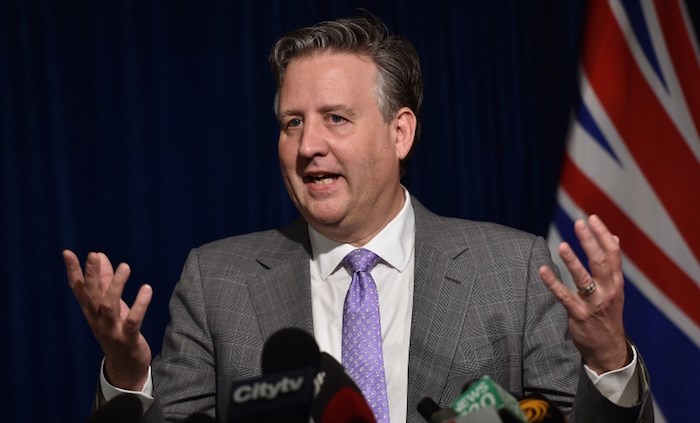Mayor Kennedy Stewart says he supports a proposed property tax increase of 4.9 per cent to help pay for the city’s $1.5-billion operating budget and $371 million in new spending for projects such as a $20-million upgrade to the Granville Bridge.
Stewart announced his decision Tuesday to reporters gathered outside the council chamber after he and city councillors heard a presentation from Patrice Impey, the city’s general manager of finance, on both budgets and the rationale for the tax increase.
 Mayor Kennedy Stewart said Tuesday that he supports a proposed property tax increase of 4.9 per cent. Photo Dan Toulgoet
Mayor Kennedy Stewart said Tuesday that he supports a proposed property tax increase of 4.9 per cent. Photo Dan Toulgoet
The mayor and council had yet to vote on the budgets and were to hear from more than 30 people who registered to speak Tuesday afternoon. Council is scheduled to deliver a final vote Dec. 18.
“I think it’s important for folks to know that of that 4.9 per cent increase, most of that is outside the control of council,” said the mayor, noting 2.2 per cent is related to inflation and collective agreement increases for employees, 1.7 per cent is to cover the new provincial government-driven employer health tax and one per cent is for infrastructure upgrades.
The tax increase, if approved, means an owner of a single-family home assessed at $1.8 million will pay $108 more than this year’s bill. The owner of a median business property assessed at $855,300 will pay an extra $193.
The mayor acknowledged the 4.9 per cent is not the full cost of what property owners will pay next year. Utility fees for sewer, water and solid waste are also set to increase, meaning the total hit to an owner’s wallet when blending the tax and fees is closer to 6.3 per cent.
“Nobody likes to pay new taxes, but for an average condo owner, this will mean about three dollars a month that they’ll be paying,” said Stewart, emphasizing the need to fulfill commitments to hire more police officers and firefighters. “I’ll be supporting the budget. I’ve looked at it very carefully, sat through many briefings by staff and I do think it’s prudent.”
In questions to senior staff during Tuesday morning’s portion of the meeting, OneCity Coun. Christine Boyle noted many were new to the job and asked what delaying a vote until the new year would mean for the budgets.
Impey said it was “a best practice” to have council approve the budgets before the end of the year, even though April 1 is the final deadline set in law. This way, she said, staff is able to plan ahead for next year’s projects.
“All the infrastructure renewal that needs to be done would be delayed,” Impey said. “Other investments we’re trying to achieve — housing, etcetera — would all be delayed.”
Jerry Dobrovolny, the city’s chief engineer, pointed out that revenue anticipated from increases in utility fees would not kick in Jan. 1, if approval of the budgets was delayed. He said such a delay could significantly affect construction schedules of infrastructure projects.
NPA Coun. Melissa De Genova, the chairperson of the city’s finance committee, said Tuesday she wasn’t prepared to say whether she supported the budgets until she heard from speakers and had more questions answered from city staff.
De Genova said she will ask city staff whether some of the revenue collected from the empty homes tax—which is used to fund the administration of the tax and the balance placed in a fund for affordable housing—could be redirected to general revenue to lower property taxes.
“I really don’t want Vancouver to win an award for becoming the second or first least affordable city in the world — we’ve been sitting at the third least affordable city in the world for quite some time now,” said De Genova, who is one of five NPA councillors on the 11-member council. “Without a clear majority on city council, I think that it’s important that we work together to try and make this budget as affordable as possible.”
In a response to a reporter’s question about delaying the budget vote, Coun. Pete Fry, one of three Green Party councillors, said that such a move would complicate the capital budget and “certain expenditures and commitments.”
“We need to be more mindful of the big picture,” he said. “I was realizing that between Metro [board of directors] and Vancouver [council] and all the electeds who have left have really left us in a position where we have to account for a lot of what they failed to account for.”
A city survey conducted to coincide with staff’s budget recommendations showed that only 15 per cent of residents and seven per cent of business owners were prepared to pay a four per cent property tax increase. That compares to 66 per cent of residents and 59 per cent of business owners who said they would be willing to pay a one per cent tax increase.
This year's tax hike was 4.24 per cent. It was 3.9 in 2017.



